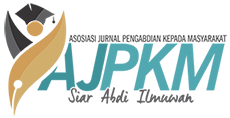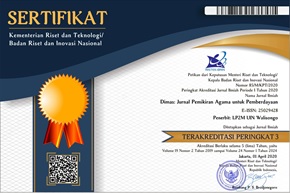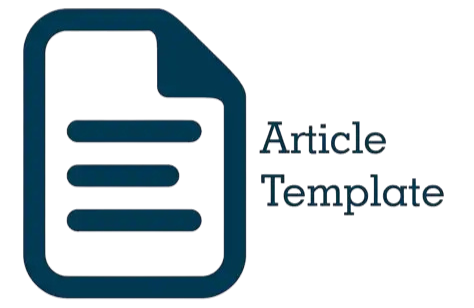Improving Teacher Competence in Managing Information Technology-Based Learning Materials
DOI:
https://doi.org/10.21580/dms.2023.231.15347Keywords:
competence, teacher, learning materials, information technologyAbstract
Teacher Competency Standards are measures that determine the competence and professionalism of teachers. Hence, competence in managing learning materials is essential for the learning process. In the era of the Fourth Industrial Revolution (4.0), educators are expected to be proficient in managing information technology-based learning materials, ensuring that the content delivered to students is of higher quality, ultimately leading to expected learning outcomes. This community service program aimed to improve teacher competence in managing information technology-based learning materials through Information and Communication Technology (ICT) training. The contents included basic knowledge regarding ICT, learning material management applications, graphic design, practical training in managing learning materials, internet, and internet-based learning (e-learning). The method employed in the present community service was Participatory Action Research (PAR). The project involved 25 school teachers, resulting in an improvement in teacher competence in managing information technology-based learning materials and fostering strong motivation among teachers to utilize information technology media for gathering materials and implementing the learning process.
Downloads
References
Almeida, F., & Simoes, J. (2019). The Role of Serious Games, Gamification and Industry 4.0 Tools in the Education 4.0 Paradigm. Contemporary Educational Technology, 10(2), 120–136. https://doi.org/10.30935/cet.554469
Anwar, C., Saregar, A., Hasanah, U., & Widayanti, W. (2018). The Effectiveness of Islamic Religious Education in the Universities: The Effects on the Students’ Characters in the Era of Industry 4.0. Tadris: Jurnal Keguruan Dan Ilmu Tarbiyah, 3(1), Article 1. https://doi.org/10.24042/tadris.v3i1.2162
Arsini, A. (2018). Penguatan Kompetensi dan Keterampilan Guru Madrasah Se-Kota Semarang dalam Mengembangkan “Web Based Assesment” Menggunakan Schoology. Dimas: Jurnal Pemikiran Agama untuk Pemberdayaan, 17(2), Article 2.
Cahyadi, R. A. H. (2019). Pengembangan Bahan Ajar Berbasis Addie Model: Halaqa: Islamic Education Journal, 3(1), Article 1. https://doi.org/10.21070/halaqa.v3i1.2124
Jejen Musfah. (2012). Peningkatan Kompetensi Guru: Melalaui Pelatihan dan Sumber Belajar Teori dan Praktik. KENCANA.
Kholiq, A. (2022). Mentoring Program on Conducting Research and Writing Scientific Paper for Civil Servant Teachers. Dimas: Jurnal Pemikiran Agama Untuk Pemberdayaan, 22(2), Article 2.
König, J., Jäger-Biela, D. J., & Glutsch, N. (2020). Adapting to online teaching during COVID-19 school closure: Teacher education and teacher competence effects among early career teachers in Germany. European Journal of Teacher Education, 43(4), 608–622. https://doi.org/10.1080/02619768.2020.1809650
Melor. (2013). Using ICT in teaching English. TEFLIN Journal, 25(1).
Morales, M. P. E. (2016). Participatory Action Research (PAR) cum Action Research (AR) in Teacher Professional Development: A Literature Review. International Journal of Research in Education and Science, 2(1), 156–165.
Muhali, M. (2018). Arah Pengembangan Pendidikan Masa Kini Menurut Perspektif Revolusi Industri 4.0. Prosiding Seminar Nasional Lembaga Penelitian Dan Pendidikan (LPP) Mandala, 0(0), Article 0. https://doi.org/10.1234/.v0i0.425
Nurdiansyah. (2016). Developing ICT-Based Learning Model to Improve Learning Outcomes IPA of SD Fish Market in Sidoarjo. International Research Clinic & Scientific Publications of Educational Technology.
Nurpratiwi, S., Amaliyah, A., Hakam, A., & Romli, N. A. (2021). Developing Teacher Professionalism in Online Learning Through Assistance of Web-Based Digital Teaching Materials. Dimas: Jurnal Pemikiran Agama Untuk Pemberdayaan, 21(2), Article 2.
Prayitno, M. A., & Tauhidah, D. (2020). Pendampingan bagi Guru Madrasah Aliyah dalam Proses Penyusunan Soal Berbasis Daring dengan Aplikasi Quizziz. Dimas: Jurnal Pemikiran Agama Untuk Pemberdayaan, 20(1), Article 1.
Situmorang & Winarno. (2008). ,Pendidikan Profesi dan Sertifikasi Pendidik. Macanan Jaya Cemerlang.
Supandi, A., Sahrazad, S., Wibowo, A. N., & Widiyarto, S. (2020). Analisis Kompetensi Guru: Pembelajaran Revolusi Industri 4.0. PROSIDING SAMASTA, 0(0), Article 0. https://jurnal.umj.ac.id/index.php/SAMASTA/article/view/6692
Surani, D. (2019). Studi Literatur: Peran Teknolog Pendidikan Dalam Pendidikan 4.0. Prosiding Seminar Nasional Pendidikan FKIP, 2(1), Article 1.
Syamsuar, S., & Reflianto, R. (2019). Pendidikan Dan Tantangan Pembelajaran Berbasis Teknologi Informasi Di Era Revolusi Industri 4.0. E-Tech : Jurnal Ilmiah Teknologi Pendidikan, 6(2), Article 2. https://doi.org/10.24036/et.v2i2.101343
Thefiddy, S. G. A. (2020). Pendidikan Era Revolusi Industri di Tengah Covid-19. ombudsman. https://www.ombudsman.go.id
Undang-undang Tentang Guru dan Dosen, Pub. L. No. 14 (2005).
Zulaiha, S., Sagiman, S., & Mutia, M. (2019). Edukasi literasi informasi bagi anak dan remaja untuk meminimalisir penyalahgunaan media jejaring sosial. Jurnal Harkat : Media Komunikasi Gender, 15(2), Article 2.
Downloads
Published
Issue
Section
License
Copyright
The copyright of the received article shall be assigned to the journal as the publisher of the journal. The intended copyright includes the right to publish the article in various forms (including reprints). The journal maintains the publishing rights to the published articles. Therefore, the author must submit a statement of the Copyright Transfer Agreement.*)
Licensing

This work is licensed under a Creative Commons Attribution-ShareAlike 4.0 International License.
In line with the license, authors are allowed to share and adapt the material. In addition, the material must be given appropriate credit, provided with a link to the license, and indicated if changes were made. If authors remix, transform or build upon the material, authors must distribute their contributions under the same license as the original.
_______
*) Authors whose articles are accepted for publication will receive confirmation via email and send a Copyright Transfer Agreement.









